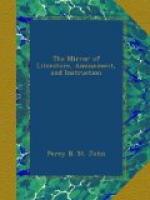The character of Lord Spoonbill is struck out with singular felicity and spirit:—
Lord Spoonbill was not one of those careless young men who lose at the university what they have gained at school; one reason was, that he had little or nothing to lose; nor was his lordship one of those foolish people who go to a university and study hard to acquire languages which they never use, and sciences which they never apply in after-life. His lordship had sense enough to conclude that, as the nobility do not talk Greek, he had no occasion to learn it; and as hereditary legislators have nothing to do with the exact sciences, it would be a piece of idle impertinence in him to study mathematics. But his lordship had heard that hereditary legislators did occasionally indulge in other pursuits, and for those pursuits he took especial care to qualify himself. In his lordship’s cranium, the organ of exclusiveness was strongly developed. We do not mean that his head was so constructed internally, as to exclude all useful furniture, but that he had a strong sense of the grandeur of nobility and the inseparable dignity which attaches itself to the privileged orders. The only instances in which he condescended to persons in inferior rank, were when he was engaged at the race-course at Newmarket, or when he found that condescension might enable him to fleece some play-loving plebeian, or when affairs of gallantry were concerned. In these matters no one could be more condescending than Lord Spoonbill. We should leave but an imperfect impression on the minds of our readers if we should omit to speak of his lordship’s outward and visible form. This was an essential part of himself which he never neglected or forgot; and it should not be neglected or forgotten by his historian. He was tall and slender, his face was long, pale and thin, his forehead was narrow, his eyes large and dull, his nose aquiline, his mouth wide, his teeth beautifully white and well formed, and displayed far more liberally than many exhibitions in the metropolis which are only “open from ten till dusk.” His lips were thin, but his whiskers were tremendously thick. Of his person he was naturally and justly proud. Who ever possessed such a person and was not proud of it?
Colonel Crop was only Colonel Crop; he enjoyed the rank of colonel, and that was all the rank that he could boast; he was tolerated at the castle; he dined occasionally with his lordship; and occasionally partook of the pleasure of shooting the birds which were cultivated on his lordship’s estate. In town, he patronised the countess’ routs, and in the country he was a companion for the earl, when not otherwise engaged. He was proud of the earl’s acquaintance, though he was not weak enough to suppose that he was more than tolerated. The haughtiest of the great do sometimes pick up such acquaintances as Colonel Crop, and they cannot easily get rid of them.




